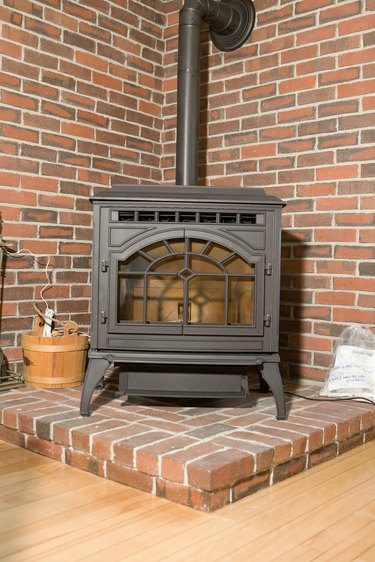
In addition to creating visual appeal and making the rooms feel cozy, a wood stove is practical. It's simple to use, and setting a desired temperature is relatively simple. Overheating is a concern for wood stoves, though, because too much heat creates the risk of a chimney fire.
Thermometer
Video of the Day
Every wood stove should have a working thermometer installed on its stove pipe. The thermometer is an important safety mechanism that allows you to monitor the temperature of the stove closely. A wood stove should burn at a temperature from 400 to 900 degrees Fahrenheit unless otherwise indicated by its user's manual. An internal temperature of more than 900 degrees is unsafe and poses the risk of a fire in the stove pipe. If the thermometer is broken, avoid using the wood stove until you can install a replacement thermometer.
Video of the Day
Control
Although wood stoves are available in many styles, they all have vents that can be adjusted to control fire temperature. Because oxygen is necessary for a fire to burn, opening the vents helps a fire grow because it provides access to more oxygen. Monitor the stove's thermometer, and adjust the stove's vents accordingly. Open the vents to make the fire's temperature from 400 to 900 F, and close the vents slightly when the temperature reaches the recommended maximum level.
Overheating
If the wood stove's temperature exceeds 900 F, immediate measures are necessary to lower the temperature. Close the stove's vents completely because the resulting lack of oxygen reaching the fire will cause it to die quickly. Avoid taking extreme measures such as dumping water on the fire; the rapid change in temperature will harm the stove.
Cleaning
Keeping the wood stove's chimney and pipes clean is an important measure to prevent overheating. If the pipes have a buildup of soot and creosote, then heat from the stove will not be able to escape. A dirty chimney is also a fire risk. Call a licensed chimney cleaner to inspect and clean your wood stove's chimney once per year. Performing the task yourself is possible, but it's dirty and difficult.